Running a successful retail business requires more than just quality products; it demands streamlined operations and effective inventory control. The right ERP system enables retailers to improve efficiency and strengthen customer satisfaction as business complexities continue to grow.
However, many retail managers face obstacles such as disconnected systems, inaccurate inventory tracking, and limited access to real-time insights. These issues often lead to delays, reduce customer satisfaction, and result in missed revenue opportunities in highly competitive markets.
The ERP for retailers market was valued at USD 10.34 billion in 2023 and is forecasted to hit USD 28.58 billion by 2032, showing how vital these systems have become. Continue reading to explore the 13 best retail ERP solutions in Malaysia, and request a free demo of HashMicro ERP software to see it in action.
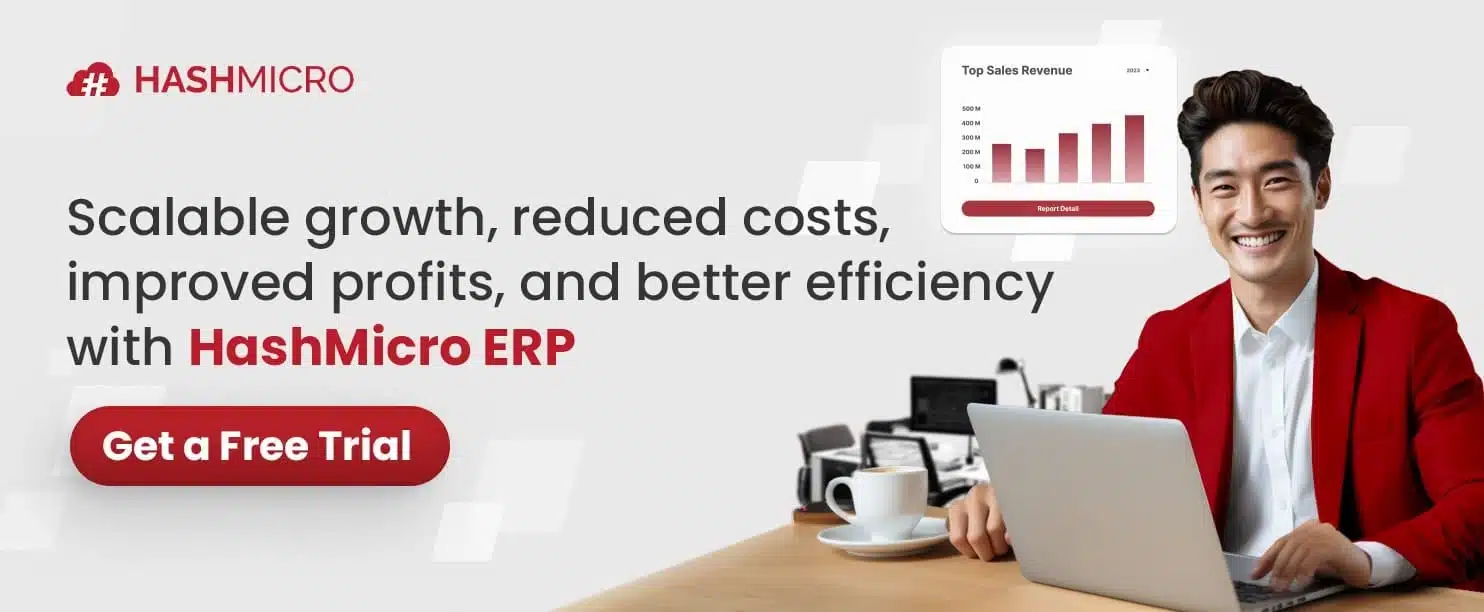
Key Takeaways
|
What is Retail ERP?
A retail ERP is a comprehensive solution that centralizes all retail operations into one integrated platform. By combining inventory management, customer tracking, and financial reporting, retail ERP systems help businesses operate more accurately and efficiently.
Retail ERP software enables real-time data flow across departments, eliminating the need for manual updates and reducing errors. When a sale occurs, the ERP system instantly updates inventory, financial records, and customer data for seamless coordination.
In Malaysia’s fast-paced retail sector, adopting retail ERP Malaysia solutions gives businesses a strong competitive advantage. With automation and synchronized workflows, an ERP system for retail businesses enables companies to focus on strategic growth and enhance the customer experience.
Hashy AI Fact

Need to know!
Hashy AI helps manage customer loyalty by automating reward tracking in your retail ERP, making it easier to build lasting relationships and encourage repeat purchases.
Request a free demo today!
Key Features of Retail ERP Systems
Retail ERP systems integrate various business functions into one platform, improving efficiency and decision-making. The key components typically include:
- Inventory Management: Real-time tracking of stock levels, ensuring the right products are available when needed, and preventing overstocking or stockouts.
- Point of Sale (POS) Integration: A robust POS system allows seamless transactions across all channels (online and offline), providing accurate and up-to-date sales data for the business.
- Customer Relationship Management (CRM): Integrates customer data for personalized marketing and promotions, improving customer retention and satisfaction.
- Supply Chain Management: Streamlines procurement, order fulfillment, and supplier collaboration, ensuring timely delivery of goods and services.
- Financial Management: Handles financial operations such as billing, invoicing, and accounting, helping businesses maintain accurate financial records and ensuring compliance.
- Human Resource Management: Manages workforce details, including payroll, attendance, and performance tracking, optimizing human resources across the business.
These components work in harmony to ensure smooth operations, better data accuracy, and improved customer experience.
13 Best Retail ERP Recommendations in Malaysia
There are many retail ERP choices available in Malaysia. Because each one is unique, choosing the most suitable retail ERP for your business is important. So, here are several recommendations for the best retail ERP software in Malaysia.
- HashMicro: Serving many clients from medium to large enterprises in Malaysia.
- Epicor Propello: Combining CRM capabilities to enhance customer satisfaction and operational efficiency
- Acumatica: User-friendly ERP solutions with integrated CRM functionalities.
- Oracle NetSuite: Top choice for large enterprises, thanks to its in-depth analytics and advanced functionalities.
- Infor: Offering advanced technological solutions tailored to retail companies.
- Microsoft Dynamics 365: Integration with Office 365 and cloud-based services enables seamless operations.
- QuickBooks: User-friendly retail CRM software integrated with accounting features.
- Aptean: Ensures smooth adoption and optimized operations through real-time data.
- Brightpearl: Offers a comprehensive suite for sales order, inventory, retail accounting, and supplier management.
- SAP: Offering a high-performance, in-memory database that integrates all critical business functions.
- Intact: Flexible ERP solution tailored for small to medium-sized businesses.
- Odoo: Provides a comprehensive suite of open-source business management applications.
- Sage: Trusted solution for retail, offering integrated CRM features and cloud-based tools to streamline processes.
1. HashMicro Retail ERP
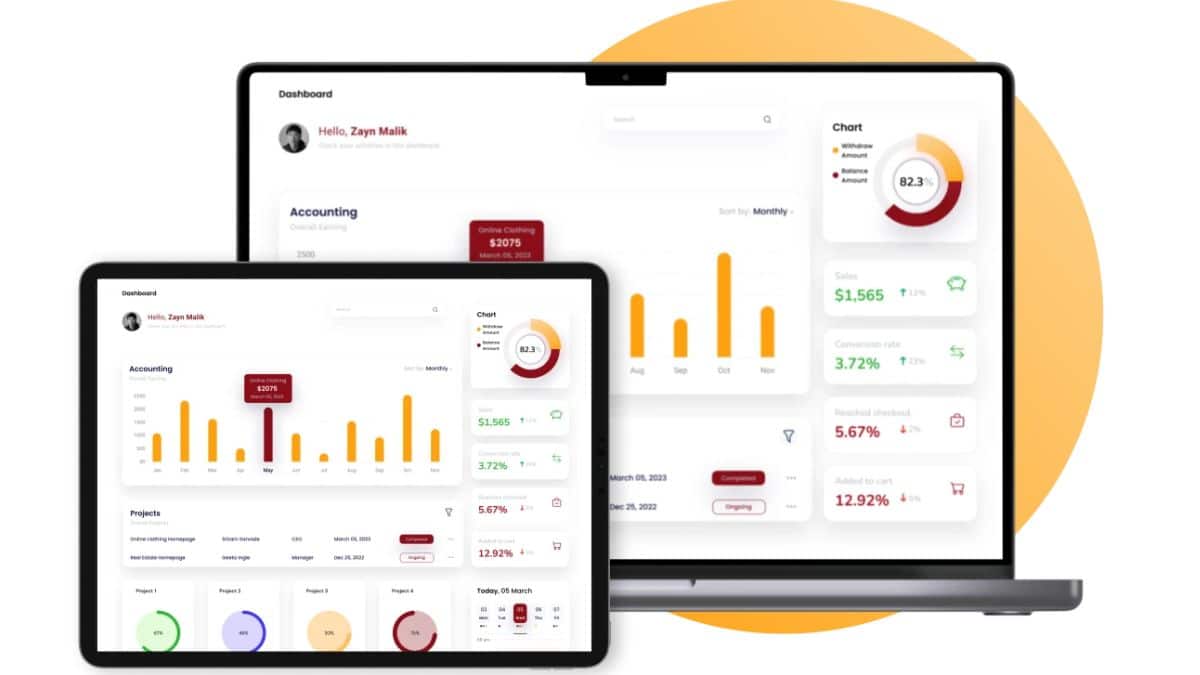
HashMicro ERP Software is the best retail ERP in Malaysia. HashMicro provides a comprehensive cloud-based enterprise resource planning solution to enhance business processes through extensive workflow automation and seamless inter-departmental integration.
It is particularly well-suited for various industries, especially retail businesses. Serving a wide range of clients from medium to large enterprises in Malaysia, HashMicro offers numerous benefits, including customizable features, unlimited users, and a free demo service.
With exceptional customer support, HashMicro is ideal for retail businesses aiming to optimize operations and improve inventory management. Here are the key features of HashMicro Retail ERP:
- Stock Optimizer: Retail ERP software optimizes inventory levels by predicting stock requirements, reducing excess inventory, and ensuring that the right amount of stock is available at the right time.
- Centralized Multi-Branch POS: Manages sales from multiple retail branches in one centralized system, providing real-time insights and seamless management of sales data across all locations.
- Automated Promotion Management: Automatically schedules and manages promotional campaigns, allowing for practical discount application and streamlined promotional activities without manual intervention.
- Loyalty Points Management: Tracks customer loyalty points and manages reward programs, encouraging repeat purchases and enhancing customer retention through personalized incentives.
- Integrated with Barcode, RFID: Supports barcode and RFID technology for faster and more accurate inventory management, minimizing manual errors and improving the speed of stock-taking processes.
- Settlement with Auto Reconciliation to Banks: Automates the reconciliation process between sales transactions and bank records, ensuring accurate financial reporting and reducing manual workload.
- Omni-channel integration: It will synchronize online and offline sales channels, providing a unified view of customer transactions and inventory and enhancing the overall customer shopping experience across all touchpoints.
Pricing: available upon request (contact HashMicro team)
Best for: medium to large Malaysian enterprises that need a fully integrated ERP and CRM ecosystem.
| Pros | Cons |
|
|

If you would like to get a personalized quote and understand the potential investment, you can download the price scheme below.
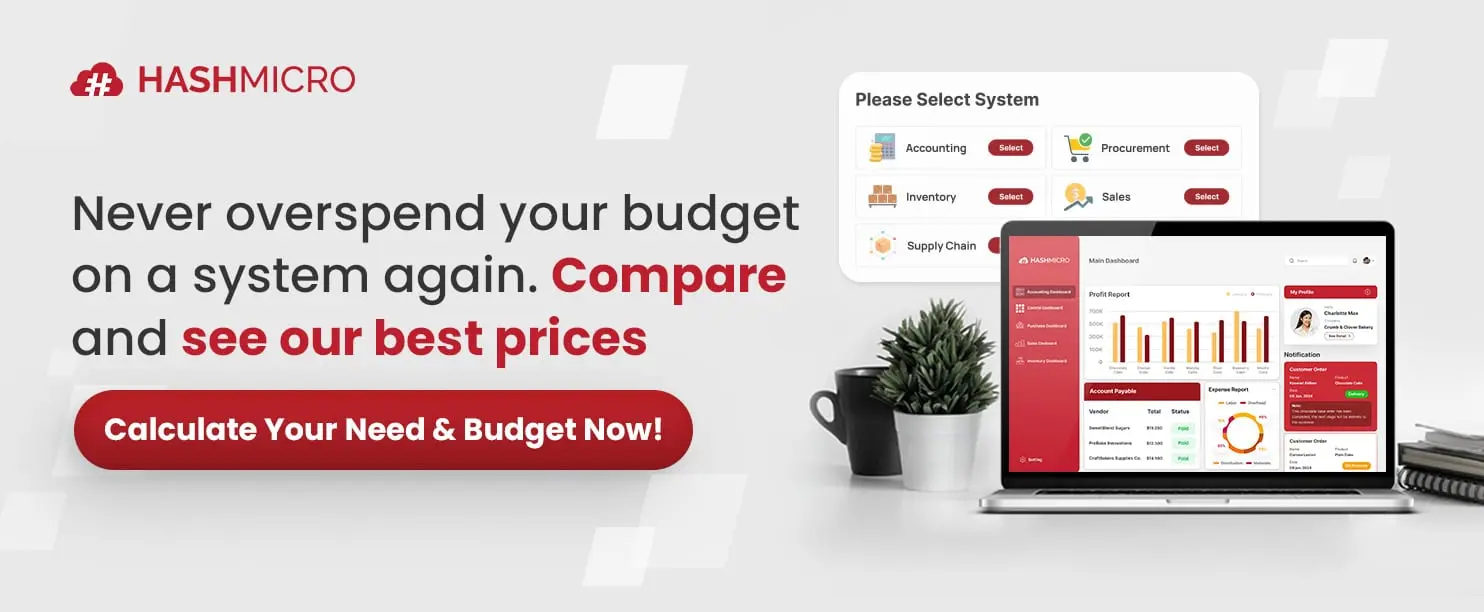
2. Epicor Propello for Retail
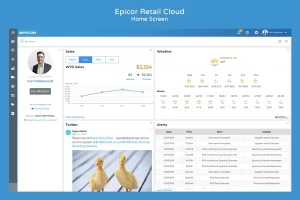
Epicor Propello specializes in ERP solutions for retailers, combining CRM capabilities to enhance customer satisfaction and operational efficiency. Its tailored business software addresses challenges in manufacturing, distribution, retail, services, and even niche areas like additive manufacturing ERP.
For retailers, Epicor retail ERP software offers robust cloud and on-premises solutions to meet various operational needs. However, its complexity and high deployment costs may pose challenges, particularly for smaller retailers or those without strong technical expertise.
Feature List:
- Payment Processing
- E-commerce Integration
- Customer Support
- Loyalty Programs
Pricing: starting at ~RM1,435 (from $349)
Best for: companies seeking CRM-driven improvements in customer satisfaction and operational visibility.
| Pros | Cons |
|
|
3. Acumatica Retail-Commerce Edition
 Acumatica offers a Retail-Commerce Edition designed for businesses seeking flexible, user-friendly ERP solutions with integrated CRM functionalities. This cloud-based system is tailored for small to mid-sized businesses, streamlining financials, inventory, CRM, and project management into a cohesive platform.
Acumatica offers a Retail-Commerce Edition designed for businesses seeking flexible, user-friendly ERP solutions with integrated CRM functionalities. This cloud-based system is tailored for small to mid-sized businesses, streamlining financials, inventory, CRM, and project management into a cohesive platform.
Despite its comprehensive features, Acumatica’s transaction-based pricing model can become costly for growing businesses. Additionally, Acumatica retail ERP software has extensive functionalities that may present a steep learning curve, often requiring additional training for users.
Feature List:
- Financial Management
- Manufacturing Management
- Project Accounting
- Retail Management
- Distribution Management
Pricing: annual subscription RM41,128–RM82,256+ (from $10k–$20k+ per year)
Best for: growing businesses that want a user-friendly ERP with built-in CRM features.
| Pros | Cons |
|
|
4. Oracle NetSuite OneWorld
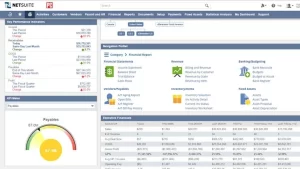
Oracle NetSuite OneWorld is a leading ERP solution offering powerful CRM tools and scalable features tailored for retail operations. It is a top choice for large enterprises, thanks to its in-depth analytics and advanced functionalities.
While Oracle Cloud ERP provides comprehensive tools like inventory management, POS, and customer insights, its complexity can pose challenges. Effective implementation often requires significant resources, training, and longer adaptation periods for users.
Feature List:
- Integrated Inventory Management
- Point-of-Sale System Integration
- Customer Insights
- Real-Time Data Analytics
Pricing: RM407 per user/month and RM4,109 monthly licensing fee.
Best for: large enterprises requiring advanced analytics and robust end-to-end CRM capabilities.
| Pros | Cons |
|
|
5. Infor for Retail
Infor’s retail-focused ERP combines CRM capabilities with AI-driven insights, offering advanced technological solutions tailored to retail companies. With industry-specific configurations, Infor CloudSuite ERP excels in supporting complex, global operations across sectors like manufacturing, healthcare, and retail.
However, its sophisticated features may pose challenges in implementation and maintenance, particularly for smaller businesses with limited IT resources. The system’s complexity often requires significant user training and higher costs, making Infor’s retail ERP software less accessible for enterprises with tight budgets.
Feature List:
- Advanced Analytics
- Global Supply Chain Management
- Industry-Specific Solutions
- Financial Management
Pricing: available upon request
Best for: retail companies needing industry-specific CRM and operational tools.
| Pros | Cons |
|
|
6. Microsoft Dynamics 365 Commerce for Retail
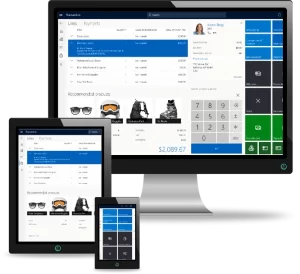
Microsoft Dynamics 365 provides a powerful suite for retail businesses, combining CRM and ERP functionalities with scalability and advanced technology. Its integration with Office 365 and cloud-based services enables seamless operations and enriched omnichannel experiences.
However, Dynamics 365’s extensive features and complexity may require significant time and resources for users to master. Customization to meet specific business needs can also be resource-intensive, potentially increasing costs for smaller businesses without dedicated IT support.
Feature List:
- Integrated with Office 365
- Predictive Customer Analytics
- Omnichannel Commerce
- Loyalty Program Management
Pricing: RM864 per user/month
Best for: businesses that rely heavily on Microsoft tools and want tight integration across cloud services.
| Pros | Cons |
|
|
7. QuickBooks POS

QuickBooks POS is an ideal solution for retailers looking for a user-friendly retail CRM software integrated with accounting features. It is especially known for its ease of use and customer-focused features.
Key Features:
- Simplified sales tracking
- Integrated payment processing
- Real-time inventory updates
- Loyalty program management
Pricing: RM3,948 one-time purchase
Best for: SMEs that need simple retail CRM functions combined with strong accounting tools.
| Pros | Cons |
|
|
8. Aptean ERP for Retail Industry
 Aptean ERP provides a tailored solution for retail businesses, offering advanced CRM tools to boost efficiency and customer satisfaction. Aptean retail ERP software has a user-centric design that ensures smooth adoption and optimized operations through real-time data updates and standardized processes.
Aptean ERP provides a tailored solution for retail businesses, offering advanced CRM tools to boost efficiency and customer satisfaction. Aptean retail ERP software has a user-centric design that ensures smooth adoption and optimized operations through real-time data updates and standardized processes.
However, its industry-specific focus may limit flexibility for businesses operating across multiple sectors or needing extensive customization. Additionally, the specialized nature of the platform can make it less intuitive for users unfamiliar with industry-specific workflows, potentially extending onboarding time.
Feature List:
- Real-Time Data Updates
- Standardized Processes
- Warehouse Management
- Omnichannel Retail Management
Pricing: custom enterprise pricing; estimates often start RM164,512+ and can scale much higher depending on scope.
Best for: companies prioritizing smooth implementation and real-time data visibility across operations.
| Pros | Cons |
|
|
9. Brightpearl Retail ERP

Brightpearl is a Retail Operations Platform designed for multi-channel retailers, combining CRM tools with robust ERP capabilities. It offers a comprehensive suite for sales order management, inventory, retail accounting, and supplier management.
While its features are powerful, Brightpearl’s retail ERP software pricing and service tiers may be challenging for smaller retailers. Additionally, the platform’s extensive functionalities often require significant training to maximize its potential.
Feature List:
- Sales Order Management
- Inventory Management
- Retail Accounting
- Purchasing & Supplier Management
Pricing: available upon request
Best for: retail and e-commerce businesses managing sales orders, stock, and supplier workflows at scale.
| Pros | Cons |
|
|
10. SAP S/4HANA Retail Industry Software
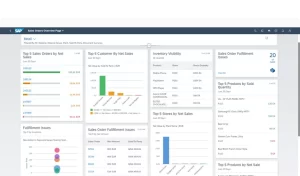
SAP S/4HANA is engineered specifically to meet the complex demands of the retail sector, offering a high-performance, in-memory database that integrates all critical business functions. It streamlines end-to-end retail processes from procurement to customer engagement.
Despite its comprehensive capabilities, SAP S/4HANA retail ERP software can be complex and resource-intensive, potentially leading to challenges in implementation, especially for smaller retailers without extensive IT infrastructure.
Feature List:
- In-memory computing
- Real-time analytics
- Supply chain optimization
- Customer engagement
Pricing: RM740–RM1,028 per user/month
Best for: enterprises requiring high-performance operations supported by a unified, in-memory data system.
| Pros | Cons |
|
|
11. Intact Business Software Retail

Intact iQ is a flexible ERP solution tailored for small to medium-sized businesses, offering a comprehensive view of business operations from a single platform. Known for its cloud capabilities, Intact iQ facilitates access across multiple mobile devices, enhancing connectivity and on-the-go management.
While Intact iQ retail ERP software offers broad functionality and flexible access, the platform’s extensive features may require a learning curve for some users. Additionally, the need for customization could complicate initial setup and ongoing management.
Feature List:
- Financial Management
- Stock Control
- Point of Sale
- Ecommerce Integration
Pricing: starting at RM8,226
Best for: small to mid-sized businesses seeking a flexible CRM-enabled ERP solution.
| Pros | Cons |
|
|
12. Odoo Retail ERP Solutions
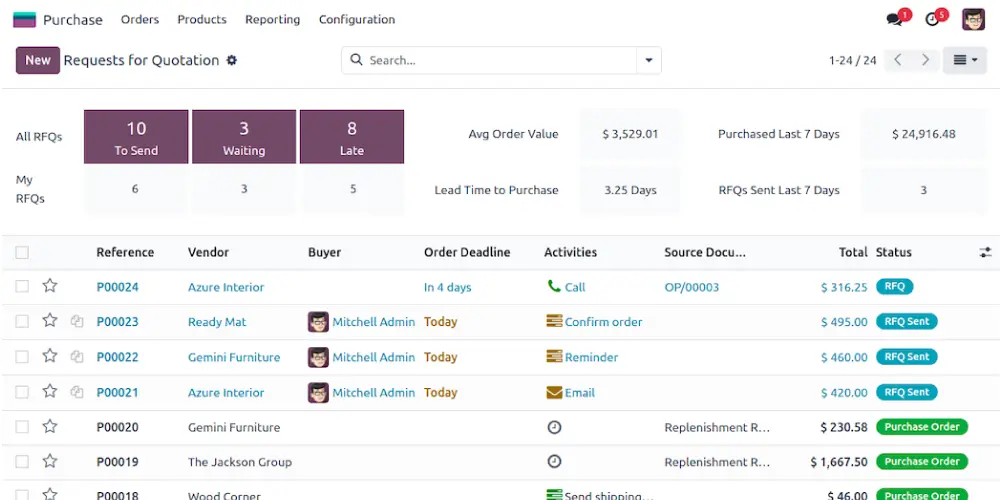
Odoo provides a comprehensive suite of open-source business management applications, designed to suit a variety of business needs, including CRM, e-commerce, inventory management, accounting, and more. This retail ERP software is especially noted for its modular structure, allowing companies to add or modify applications as their business grows.
Some users find the system’s extensive features overwhelming, and substantial customization may require technical expertise or external assistance. Furthermore, while Odoo does offer a free version, scaling up and utilizing more extensive features can become costly as more applications are added and more users are supported.
Feature List:
- CRM
- E-commerce
- Inventory Management
- Point of Sale
Pricing: standard RM102/user/month or custom RM154/user/month
Best for: companies wanting customizable, open-source applications across CRM and business operations.
| Pros | Cons |
|
|
13. Sage ERP for Retail Industry
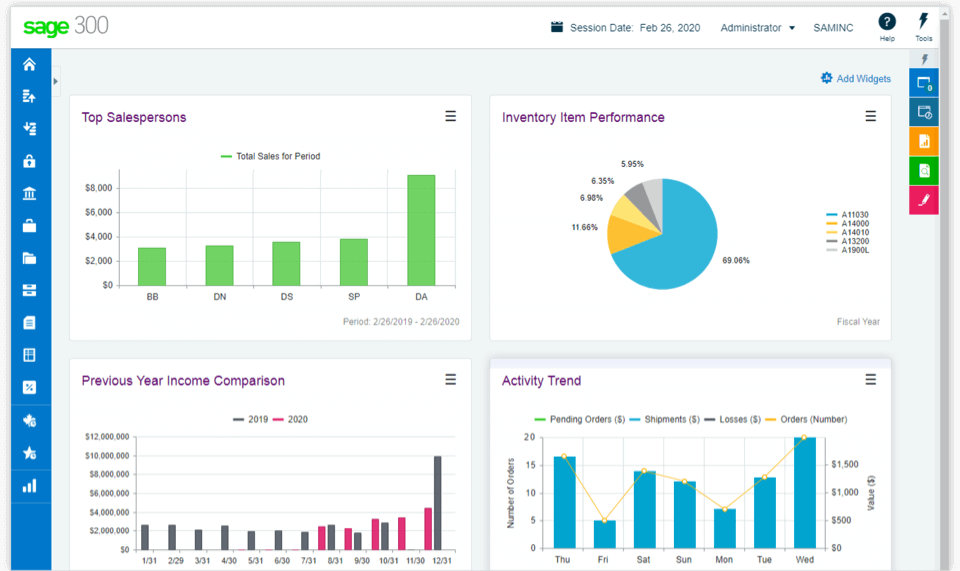
Sage ERP is a trusted solution for retail businesses, offering integrated CRM features and cloud-based tools to streamline processes. With options like Sage 100, 300, and X3, it caters to small and medium-sized businesses across industries such as wholesale, manufacturing, and retail.
Feature List:
- Inventory and order management
- Human Resources
- Accounting
- Customer Relationship Management (CRM)
- Inventory and order management
- Personalized customer engagement tools
- Real-time performance tracking
Pricing: available upon request
Best for: retail businesses looking for trusted CRM tools paired with cloud-based process streamlining.
| Pros | Cons |
|
|
Comprehensive Comparison of Retail ERP in Malaysia
| Provider | Connection Quality | Bank Coverage | Ease of Integration | Data Enrichment |
|---|---|---|---|---|
| Hashmicro | ||||
| Epicor Propello | ||||
| Acumatica | ||||
| Oracle NetSuite | ||||
| Infor | ||||
| Microsoft Dynamic 365 | ||||
| QuickBooks | ||||
| Aptean ERP |
Benefits of Retail ERP for Retail Businesses

Investing in a retail ERP is a strategic decision that can transform retail businesses’ operations. As a comprehensive business process management software, retail ERP offers numerous benefits, especially in the competitive market of retail ERP Malaysia:
- Streamline operations: A retail ERP system integrates critical business functions like sales, retail inventory management, and customer handling into one centralized system. This eliminates the need for separate tools and ensures smoother daily operations.
- Lower operational costs: By consolidating processes into a single platform, ERP for the retail industry reduces the reliance on additional software, cutting expenses on licenses and maintenance fees. This leads to more efficient resource management.
- Enhance real-time data access: With a retail ERP system, business owners can access real-time insights on sales, inventory levels, and customer behaviors. This improves decision-making and ensures businesses can respond promptly to changing market demands.
- Facilitate better communication: Integrated retail ERP systems break down silos between departments by providing a unified platform for data access. This improves collaboration and ensures everyone is working with accurate, up-to-date information.
- Automate routine tasks: From retail inventory management to order processing and financial reporting, retail ERP software automates routine tasks, minimizing human error. It also frees employees to focus on strategic initiatives that drive growth.
- Go paperless: Retail ERP systems store data digitally, eliminating the need for physical paperwork. This reduces storage costs, ensures data security, and allows easy access to essential records, especially with cloud-based solutions.
- Improve scalability: ERP for the retail industry can scale with your operations, whether expanding locations or introducing new products. This makes it an ideal long-term solution for businesses planning growth.
- Reduce IT maintenance: Cloud-based retail ERP Malaysia solutions automatically handle updates, security patches, and maintenance. This reduces the need for an in-house IT team and ensures you always have access to the latest features.
By adopting retail ERP software and retail accounting software, businesses can simplify their operations and position themselves for success in a dynamic market. With features like point-of-sale integration and real-time data, a retail ERP system is a must-have for modern retailers.
Key Qualities of the Best Retail ERP

When choosing a retail ERP for your business, looking for features that ensure smooth operations, scalability, and customer satisfaction is essential. Here are the defining attributes of the best retail ERP software:
- Comprehensive Inventory Management: A retail ERP offers real-time stock visibility across channels. It helps prevent overstock and stockouts, ensuring efficient inventory control for stores and e-commerce.
- Seamless Point-of-Sale Integration: A top retail ERP integrates with POS systems for fast, accurate transactions. It supports various payment methods for a smoother checkout experience.
- Enhanced Customer Relationship Management (CRM): With CRM features, retailers can manage customer data, run promotions, and create loyalty programs to boost engagement and repeat sales.
- Strong Supply Chain Management: ERP software simplifies procurement, order tracking, and demand forecasting—ensuring products are stocked based on customer demand and market trends.
- Omnichannel Retail Support: The right ERP connects online and offline channels, delivering consistent customer experiences and centralized control over sales and inventory.
Choosing the right operations management software for the retail industry is a critical step for businesses in Malaysia aiming for growth and operational excellence. By focusing on these essential qualities, businesses can ensure they invest in a system that meets today’s needs and prepares them for tomorrow’s challenges.
How to Choose an Ideal ERP Provider
Choosing the right ERP provider for your retail business is crucial to improving efficiency and ensuring long-term success. Here are the key steps to follow when selecting an ERP provider:
- Identify Your Business Needs: Understand your current processes, challenges, and objectives. Identify areas for automation, such as inventory management, CRM, or financial tools. Defining your needs helps narrow down suitable providers.
- Evaluate Scalability: Ensure the ERP system can grow with your business. The provider should offer customizable solutions that can be adjusted as your business needs evolve.
- Check Integration Capabilities: The ERP system should integrate seamlessly with your existing systems, such as POS, CRM, and supply chain software. This helps streamline operations and ensures that data flows smoothly across departments.
- Assess User-Friendliness: The system should be easy to use for both the management and employees. A complicated system can lead to resistance, errors, and training challenges.
- Consider Customer Support: Opt for a provider that offers reliable customer support and training resources. Ongoing support is essential to solve any issues promptly and keep operations running smoothly.
- Look for Industry Expertise: Choose an ERP provider with experience in your industry. A specialized provider will understand the nuances of your retail business and offer tailored solutions that are more effective.
By following these guidelines, you can select an ERP provider that fits your retail business goals and seamlessly integrates with retail POS software to help drive sustainable growth.
Conclusion
A retail ERP is a vital tool for modern businesses, especially in Malaysia’s competitive retail landscape. Businesses can improve efficiency, enhance customer engagement, and achieve sustainable growth by automating operations through the best retail ERP software.
One of the leading solutions for retailers is HashMicro Retail ERP. Equipped with comprehensive features, HashMicro helps businesses streamline operations, cut unnecessary costs, and adapt to growing demands, ensuring a competitive edge in the ERP for the retail industry.

Don’t miss the opportunity to experience HashMicro Retail ERP’s benefits firsthand. Sign up for a free demo today and discover how it can revolutionize your retail operations.

FAQs about Retail ERP Malaysia
-
What is the ERP system in retail?
An ERP system in retail integrates sales, CRM, inventory, and accounting into one platform. It streamlines operations, improves inventory tracking, and provides real-time insights to enhance customer experiences and operational efficiency.
-
What is the ERP system in Malaysia?
ERP systems in Malaysia are tailored to local business needs, including compliance with IRBM regulations. They streamline operations across industries with features like procurement, finance, and inventory management, ensuring businesses stay competitive.
-
What retail chain companies are in Malaysia?
Prominent retail chains in Malaysia include AEON, Padini, and 99 Speed Mart. These companies utilize technology like ERP systems to manage inventory and optimize supply chains, ensuring efficiency and customer satisfaction.
-
What are the three common types of ERP?
1. On-premise ERP: installed and managed on a company’s own servers.
2. Cloud ERP: hosted by the vendor and accessed online via subscription.
3. Hybrid ERP: a mix of on-premise and cloud modules for flexibility and gradual migration. -
What are some examples of an ERP?
An example of an ERP is HashMicro ERP. It offers integrated modules like accounting, inventory, procurement, HR, sales, and POS to help businesses centralize data and automate cross-department workflows. This makes it a practical option for companies that want better visibility, tighter control, and faster decision-making across operations.

































